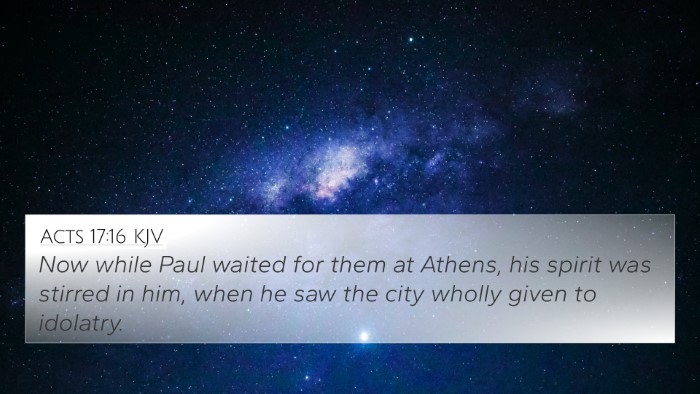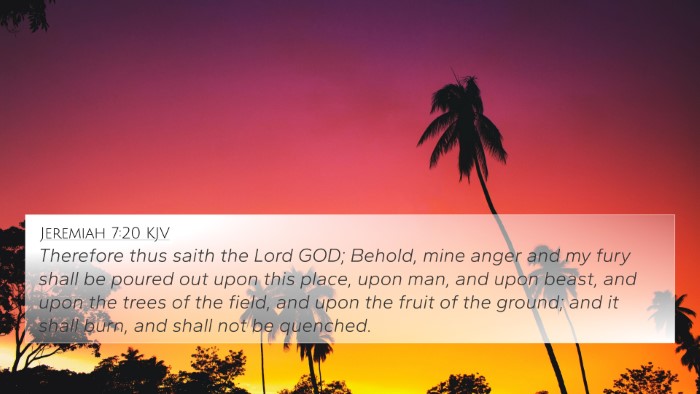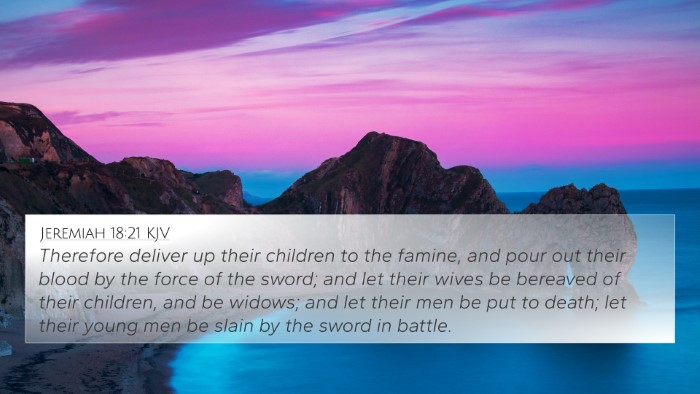Understanding Jeremiah 6:11
Jeremiah 6:11 states, "Therefore I am full of the fury of the LORD; I am weary with holding in. I will pour it out upon the children abroad, and upon the assembly of young men together." This verse reflects God's intense displeasure towards the disobedience and sinfulness of His people, Israel. In seeking to understand this verse, it's important to draw insights from various public domain commentaries, which help in interpreting its meaning and relevance.
Commentary Insights
-
Matthew Henry:
Henry emphasizes the seriousness of divine wrath and God's unwillingness to restrain His anger any longer. He highlights that the "fury of the LORD" symbolizes God's justice, which reaches its breaking point due to persistent rebellion. This is a call for the people to repent and recognize the dire consequences of their actions against God.
-
Albert Barnes:
Barnes discusses the implications of God's 'fury' and notes that the outpouring of judgment will affect both the young and the vulnerable within society. This showcases the communal nature of sin and its repercussions, emphasizing that God's response is both just and necessary to bring about righteousness.
-
Adam Clarke:
Clarke elaborates on how God's anger leads to action and punishment, describing the need for divine justice when human beings persist in wrongdoing. He also mentions the prophetic nature of Jeremiah's words, underscoring the urgency of returning to spiritual integrity before the forthcoming consequences manifest.
Cross-References and Thematic Connections
To further understand the implications of Jeremiah 6:11, we can explore several related Bible verses that enrich its context:
- Isaiah 5:25: "Therefore is the anger of the LORD kindled against his people." This verse showcases similar themes of divine anger due to the people's actions.
- Ezekiel 18:30: "Therefore I will judge you, O house of Israel, everyone according to his ways, says the Lord GOD." This highlights personal responsibility in light of God's judgment.
- Psalm 78:31: "The wrath of God came upon them." This reflects the consequences of disobedience chronicled in Scripture.
- Romans 2:6: "Who will repay each person according to what they have done." This New Testament passage affirms the concept of divine justice.
- Galatians 6:7: "A man reaps what he sows." This portrays the principle behind God's judgment and the natural outcomes of actions.
- Hebrews 10:30: "For we know Him who said, 'Vengeance is Mine, I will repay.'" This assures us of God's justice over human deeds.
- Revelation 20:12: "And the dead were judged according to their works." This points to the finality of God's judgment based on individual actions.
Comparative Analysis
Linking Bible scriptures through commentaries and cross-references reveals connections between various texts. For example:
- Connections between Old and New Testament: The principle of God’s judgment in Jeremiah is mirrored in the teachings of Jesus on accountability.
- Bible verses that relate to each other: The themes of repentance in Jeremiah are echoed in Acts 2:38, calling for a turning back to God.
- Inter-Biblical dialogue: Themes of judgment in prophetic books often converse with teachings found in the epistles, emphasizing the continuity of God's message.
Conclusion
In conclusion, Jeremiah 6:11 serves as a solemn reminder of the gravity of sin and the dependence on God's mercy through repentance. The insights from various commentaries, when combined with cross-references, provide a comprehensive understanding of this verse in the context of Scripture. Whether for personal study or sermon preparation, exploring these connections enhances our grasp of biblical themes and God's perpetual call to righteousness.















